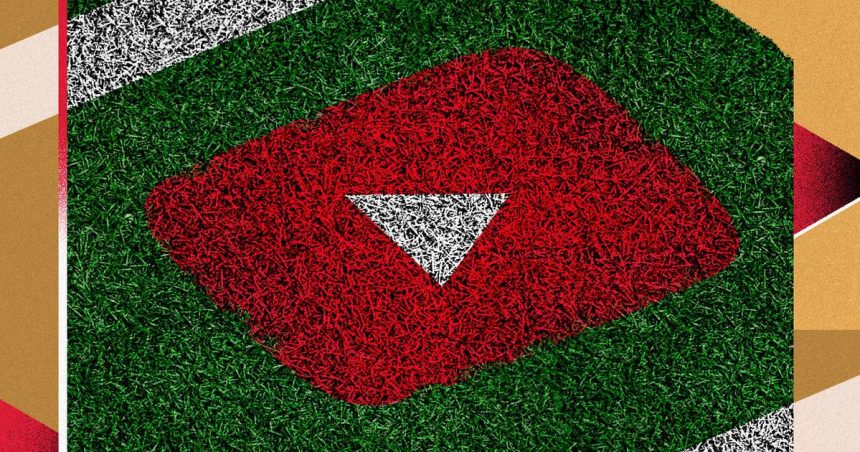This most recent NFL season will most likely be remembered because a certain international mega pop-star willingly flew to Kansas City, repeatedly, to support her football-playing boyfriend, tugging at the heartstrings of America.
Aside from the romance, it was also the kickoff to YouTube TV’s first season with the NFL’s Sunday Ticket package, which reportedly cost the platform around $2 billion per season for seven years.
For fans, the package was a quick hit. In October, the package had about 1.3 million subscribers, Bloomberg reported, citing data from Antenna—nearly as many as when it was previously on DirecTV.
YouTube, though, has been tight-lipped about the performance of the package. In its two most recent earnings calls, executives have declined to detail how many subscribers the service has or how much advertising revenue it generated, beyond saying that at least 90 advertisers, including Unilever, purchased ads either upfront or in the scatter market.
Media buyers told Marketing Brew that they had some reservations about buying Sunday Ticket, particularly because of YouTube’s move to bundle Sunday Ticket inventory with other YouTube content. Whether this offering evolves could ultimately dictate whether they spend next season, and for now, the company plans to continue offering bundled packages next season. (YouTube declined to discuss its ad sales strategy for the coming season.)
Some perspective: Subscribers, who shell out more than $400 a season for access to Sunday Ticket, are likely much more important to YouTube than any ad revenue generated from the package, explained Jeffrey Gagne, an SVP at Havas Media who specializes in sports media; YouTube can only insert a few ads during ad breaks, and otherwise streams ads from national broadcasters like CBS, Fox, and NBC.
“Growing the subscriber base is far and away going to be the priority before the ad product becomes mature,” he said.
But that Sunday Ticket audience is highly dedicated, and has enough disposable income to pay for the package in the first place. “It’s [an audience] that’s got their wallets open,” Gagne said. “It’s a very attractive audience.”
The pitch: YouTube put its NFL programming front and center of its upfronts presentation to advertisers last spring, giving stage time to NFL commissioner Roger Goodell, who at the time said that “bringing NFL Sunday Ticket [to YouTube] is just the beginning.”
Crucially, though, that presentation was held well before the company and advertisers knew how many subscribers would be signed up for Sunday Ticket at the start of the NFL season in September.
Instead of more traditional, in-game ad buys, YouTube pitched many advertisers on different bundles of inventory, five media buyers told Marketing Brew. According to one post-campaign report Marketing Brew reviewed, these could include a mix of in-game Sunday Ticket impressions, impressions from YouTube TV, and NFL-claimed content from YouTube creators like Highlight Heaven (which posts videos like “Travis Kelce FURIOUS at Andy Reid and bumps him”) or Budleewiser (which posts content like “NFL Brutal Hits of the 2023 Season!”).
Get marketing news you’ll actually want to read
Marketing Brew informs marketing pros of the latest on brand strategy, social media, and ad tech via our weekday newsletter, virtual events, marketing conferences, and digital guides.
These channels may rack up millions of views, but it was a bit of a harder sell for advertisers we spoke to.
“I hated it,” Adam Schwartz, SVP and director of national broadcasts and sports media at Horizon Media, said. “Previously, [with DirecTV], we were able to just buy Sunday Ticket.”
Though he said he understood why YouTube was leveraging its portfolio, “I’d rather just buy what I want [and] not have to buy some of the other stuff,” he told Marketing Brew. For his clients, Schwartz bought about 30% of NFL Sunday Ticket impressions, with the rest representing NFL YouTube content from creators and from the league.
Sean Edwards, associate director of programmatic at Exverus Media, told us that he had a client, New Belgium, pass on Sunday Ticket inventory last season specifically because of YouTube’s bundled offering.
“You kind of want to buy the product for what it is, and once you mix other things in, it’s kind of not the product you want to buy,” Edwards said.
Kate Mezzanotte, VP of paid media at the agency JellyFish, told Marketing Brew that she saw roughly $45 per CPM for a September media buy in the scatter market, and that reporting metrics showed that about 33% of impressions were served in-game on Sunday Ticket inventory, she told Marketing Brew. The rest were served on YouTube TV streams of ESPN and NFL Network.
“I came away feeling like it was a little bit expensive for what it came out to be,” she told Marketing Brew.
A buy for a different client later in the season in January cost more—about $57 per CPM—but only 1% of impressions ran on Sunday Ticket. The rest came from the NFL Network and ESPN, she said.
“We were expecting to run more impressions on Sunday Ticket especially because we were paying a higher CPM than the previous buy,” Mezzanotte said.
Still, she was impressed by the offering, specifically YouTube’s ability to tie impressions to Google search history, for example. And for the first time, she’s considering participating in YouTube’s upfront this spring, citing the Sunday Ticket acquisition as a “big factor in that.”
“Some of the clients we’re working with, they’re never going to buy a true NFL, traditional TV ad. That would be super cost-prohibitive,” she said. “This is a really great way to get in front of that audience.”
Schwartz agreed. Next season, he said he “absolutely intends on buying it for clients that it makes sense for.”
Read the full article here









